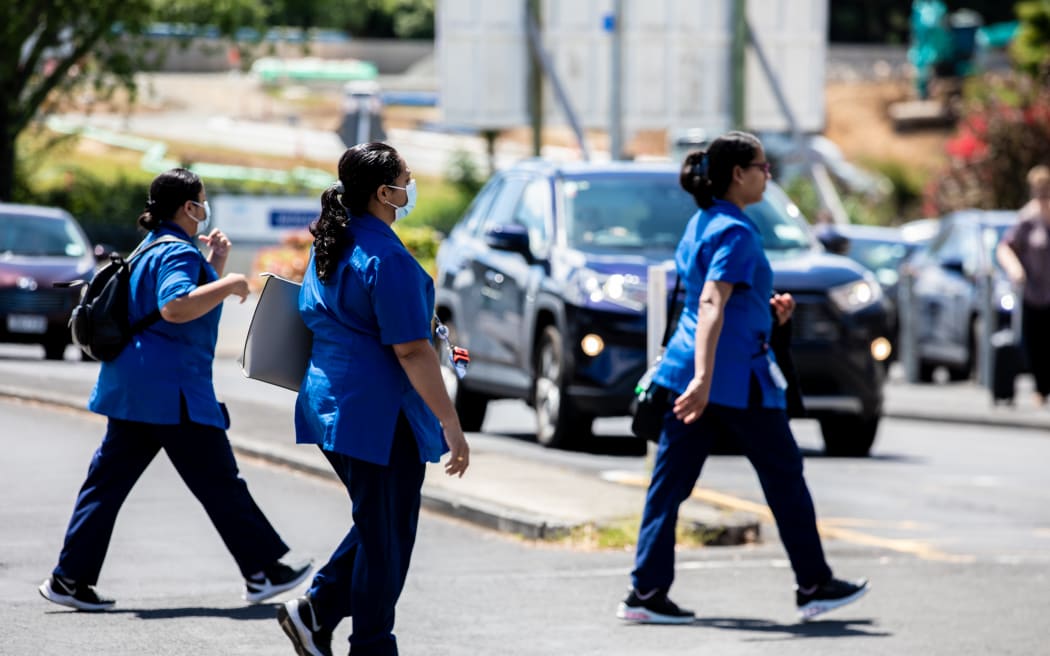
Graduate nurses who commit to working in aged care, mental health, district nursing, Well Child or in one of several hard-to-staff regions will get paid an extra $8499 after three years (file image). Photo: RNZ / Marika Khabazi
Te Whatu Ora's beefed up Voluntary Bonding Scheme for new graduates will not stop people dropping out before they even qualify, nurses and midwives warn.
The 2024 scheme has been expanded to include all new midwives nationwide - including those who graduated last year - additional regions for nurses and trainee GPs, as well as opening up to pharmacists and anaesthetic technicians for the first time.
Graduate nurses who commit to working in aged care, mental health, district nursing, Well Child or in one of several hard-to-staff regions will get paid an extra $8499 after three years.
Stick with it for two more years after that and they get a further $2833 at the end of each of those years.
However, second year nursing student Shannyn Bristowe of Whakatāne could really do with the money now.
"I've been living in my friend's shed since last April because I can't afford to pay rent anywhere.
"And when I say shed, I mean an actual uninsulated shed. We've hung a sheet from the ceiling that separates my bed from all the stuff they keep in their shed.
"I'm grateful to my friend because otherwise I don't know what I would do, how I would pay the bills. What you get from StudyLink is just not liveable."
Nursing is a second career for Bristowe, and her student loan will top $77,000 by the time she finishes the degree next year.
"There's so many people I speak to who want to do it, but the barrier for them every time is 'I have kids, I can't afford to'. Even if you don't have kids, it's just unaffordable."
Nurses Organisation kaiwhakahaere Kerri Nuku said while the bonding scheme might create some opportunities for new graduates, it would not help students like Bristowe.
"We've still got many nursing students living in the garages of friends or bed-hopping. Here's in Hawke's Bay, Cyclone Gabrielle wiped out many of the homes that our students from EIT were living in. So they're still in survival mode, and a few of them have had to pull out.
"As we see the economic crisis take a bite, we're seeing nursing students really struggling. Some are not going back next year. What I'm hearing from students is the struggle is just too real."
A district health board report in 2021 found nearly one in three nursing students drop out.
Midwifery has the largest health workforce gap, with a 40 percent shortfall across the country.
In a bid to plug those holes, Te Whatu Ora is opening up the Voluntary Bonding Scheme to all new graduates working anywhere in the country, including those who graduated in 2022.
College of Midwives spokesperson Violet Clapham said better support for students was needed, like "earn as you learn" programmes.
"At the moment the costs involved in training to become a midwife are onerous and we do see students leaving the programmes every year.
"If we were able to retain all the students coming through the schools, that would certainly add to the numbers in the profession."
A key focus of the bonding scheme is general practice, with a $30,000 payout after three years.
Māori and Pacific trainees working anywhere in the country can apply, along with others working in high-need areas - which is almost everywhere outside the main cities.
General Practice New Zealand chairperson Bryan Betty said it was "a positive move" - especially for Māori, Pasifika and rural communities - but fixing the chronic shortages in primary care was going to take "a whole suite of strategies".
"Thirty percent of practices across the country and a high number in rural and provincial areas are not accepting patients because they don't have the workforce.
"We need to address these issues."
Te Whatu Ora chief people officer Andrew Slater said the agency was continuing to look at ways to support students during their clinical placements, including more earn-and-learn pilots programmes, some of which are focused on healthcare assistants and nurses.
"We're continuing to assess the outcomes of those programmes to ensure they are supporting students as they go through their course of study."
The Voluntary Bonding Scheme was just one of several initiatives underway to boost the health workforce.
"It's a really key step that we're taking to ensure that we retain the New Zealand trained health workforce here in New Zealand.
"And it's something that we can scale up and do this year that will start having an immediate impact on the health workforce."
Last year, 488 people were accepted last year onto the scheme, which cost Te Whatu Ora about $7 million.
Registrations for the next intake are expected to open in February 2024.
"We're encouraging anyone who meets the criteria to put their application in," Slater said.
"Depending on the interest, we will be accepting everyone who meets the eligibility criteria."






